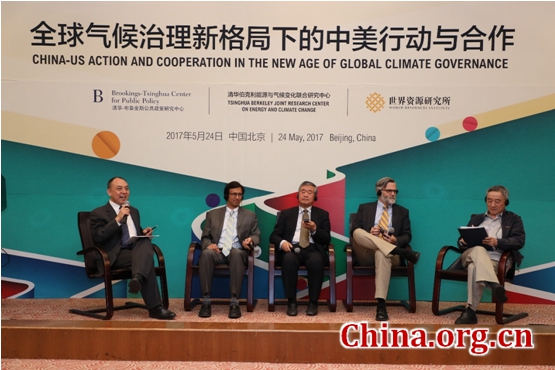|

|
|
Experts from home and abroad take part in a round-table discussion on May 24. [Photo/China.org.cn]
|
China will continue to meet promises made at the Paris Climate Change Conference and take effective measures to tackle climate change, no matter what kind of choices the U.S. new administration makes on the issue, a top Chinese climatologist said.
He Jiankun, an expert from the Specialist Committee on National Climate Change, made the remarks during a seminar on “China-U.S. Action and Cooperation in the New Age of Global Climate Governance” held in Beijing on May 24 by the Brookings-Tsinghua Center for Public Policy, Tsinghua-Berkeley Joint Research Center on Energy and Climate Change, and World Resources Institute.
The seminar provided an opportunity for experts from home and abroad to discuss the new age and trends of global climate governance, and also share progress made in China-U.S. cooperation on controlling global climate change.
He Jiankun, also director of the Institute of Low Carbon Economy at Tsinghua University, devoted much of his speech to China’s policy on climate change.
He said that, in order to keep China’s promises in signing the Paris Agreement, a series of plans and strategies on energy development had been formulated. According to the 13th Five-Year Plan, the aim is to put in place measures that can ensure, by the end of 2030, that carbon emissions per unit of GDP will decrease by 60 percent to 65 percent from the 2005 level, and non-fossil energy will account for 20 percent of primary energy consumption.
“China will, as always, seek to ensure progress to be made regarding the Paris Agreement whether the Trump administration withdraws from the agreement or not. Under the international climate governance mechanism, China will strengthen its cooperation with other countries and speed up energy production and consumption reform, greatly reducing carbon emissions,” He said.
Collaboration on climate change between China and the U.S. has always been a focus of the bilateral relationship. As the leading carbon emitters in the world, the two countries have to fulfill their responsibilities and make their own contributions to reducing the intensity of such emissions.
Manish Bapna, executive vice president and managing director of the WRI, spoke about America’s recent climate action development, and stressed the importance of China-U.S. cooperation on climate change.
“China and the United States should continue to join hands on climate change, cooperation at the state and local level, or within the private sector should be strengthened. Only in this way can the momentum of reducing greenhouse gases in these two countries be maintained,” he said.
In his speech, he introduced data showing carbon dioxide emissions in the U.S had fallen while economic growth had been maintained. When talking about the new changes in America’s climate actions, he said that policies adopted by the previous Obama administration was capable of reducing greenhouse gas emissions, but the new administration led by President Trump has already started to roll back climate and clean energy progress.
He also mentioned that, after signing the Paris Agreement, actions on creating job, investing in infrastructure and trading should be carried out together with climate change governance.
The attending experts then took part in a round-table discussion. Sam Adams, chief representative of U.S. office, WRI, shared his experiences on dealing with the carbon emission-reducing activities in Portland, Maine of the U.S. Manish Bapna and He Jiankun also discussed climate change governance from the perspective of education, technology, job and infrastructure building.
read more


